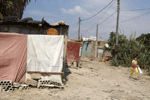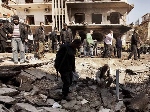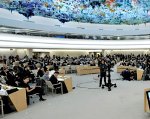Social Watch news
Published on Wed, 2016-09-14 16:47
The World Trade Organisation (WTO) should mainstream human rights into all of its activities and issue directives to the dispute settlement panels so that human rights treaty violations are not adversely affected.
This is one of the main recommendations highlighted by the UN Independent Expert on the promotion of a democratic and equitable international order, Mr Alfred de Zayas (United States), in his report to the Human Rights Council, which is currently holding its regular thirty-third session in Geneva.
"It is high time to mainstream human rights into all trade agreements and World Trade Organisation (WTO) rules and regulations, so that trade representatives and dispute-settlers know that trade is neither a ‘stand-alone' regime nor an end in itself," the rights expert said in presenting his report to the Council on Tuesday (13 September).
|
Published on Thu, 2016-09-08 20:32
Due to the lasting impact of the international financial crisis and resulting increase in poverty and insecurity, and especially due to the Government’s extensive austerity policies, Italy faces challenges in many of the areas addressed by the 2030 Agenda for Sustainable Development goal.
Moreover, the political context is critical, the result of three changes of Government without elections, in which the executive power has taken decisive initiatives for reform in many fields, including constitutional reforms, resulting in a progressive worsening of the gap between the political action of the "palace" and the daily exercise of citizen democratic participation.
Even in the one area that has seen a positive trend in recent years, namely, the development of renewable energy, there has been a reversal of the virtuous cycle since 2015. In the absence of a national energy plan, government policies continue to encourage fossil fuels (despite popular opposition), and large infrastructural works with new rules to eliminate environmental controls (introduced through the Stability Law in 2016) and with an increase in soil depletion.
|
Published on Thu, 2016-09-08 20:24

Photo: UNHCR/S. Malkawi
|
Several challenges hinder the implementation of the 2030 Agenda on Sustainable Development in Lebanon. During the UN Conference on Sustainable Development in September 2014 Lebanese President Tammam Salam identified the humanitarian issues caused by the Syrian refugee crisis as one of the greatest challenges to development. It is indeed a significant constraint; yet, one should note that Lebanon was facing a political and socio-economic crisis reflected by a high rate of unemployment and marginalized people, even before the Syrian crisis and the flood of refugees. Therefore, it is worth highlighting that the Syrian war shed light on the structural and systemic problems of Lebanon and aggravated them.
To date, Lebanon does not have a national strategy for sustainable development nor a national economic plan nor a poverty reduction strategy. According to the 2014 International Parliamentary Union Secretary General’s annual report: “the Lebanese Parliament reported that the Sustainable Development Initiative was in the agenda of the Public Work Committee between 2009-2010 period. The current political instabilities, however, forced the Parliament to shift its priorities.” The same report indicates that the Parliament has not been informed of the Sustainable Development Goals (SDGs) and has not taken any steps to discuss them.
|
Published on Thu, 2016-09-08 20:12
 |
Inequality’s unrelenting rise has been the subject of growing attention that has come, in the last few years, from unexpected quarters. As a recent example, an article appeared on the IMF’s Finance & Development journal, “Neoliberalism: Oversold?” put the spotlight on the negative effects that inequality has on the level and sustainability of growth. The article generated not only wide press coverage, but also a number of responses. Almost in sync with the article, the IMF felt the need to publish an interview with its Chief Economist, Mr. Maurice Obstfeld, clarifying that the policy rethink at the IMF did not represent revolution, but evolution. Needless to say, to many analysts who had closely followed IMF policies for years, the clarification was entirely unnecessary. In fact, critics were quick to comment that the article was only a mild departure from IMF doctrine, not reflected in actual IMF programs, and even reasserted points that continue to be the focus of contention such as the positive growth effects of trade liberalization, privatization and foreign direct investment. Nonetheless the article, reflected wider concern with inequality at an institution that until not long ago considered it an afterthought.
|
Published on Thu, 2016-09-08 19:17
Arab NGO Network for Development (ANND) held a seminar to discuss issues related to Business and Human Rights in the context of the Pilot Project for the Promotion of Social Dialogue in the Southern Mediterranean Region.
|
Published on Thu, 2016-09-08 18:34
In the context of the Pilot Project for the Promotion of Social Dialogue in the Southern Mediterranean Region (SOLiD), in partnership with the International Trade Union Confederation (ITUC) and BUSINESSMED, ANND held a two day seminar in Beirut on 7 and 8 September 2016, to discuss issues related to Business and Human Rights.
Roberto Bissio, Social Watch Coordinator, joined the workshop participating in Session 1, The privet Sector and the New Development Paradigm - A Rights Based Perspective, Financing for Development from a Rights Based Approach (see his intervention below).
|
Published on Thu, 2016-09-01 19:01
 |
After more than five years, the conflict in Syria represents a catastrophic failure of the “international system” in terms of maintaining basic human rights (including the right to live), peace and stability. This system, including the UN as well as influential world states and organizations, has failed to reduce the escalation of conflict, let alone create effective mediation processes to reach a decent solution. Furthermore, many international and regional actors have fueled the conflict by providing political, military, logistic and financial support to the warring parties, investing in identity politics to deepen polarization and strengthening hostility and a spirit of revenge in their local affiliates. The conflict has largely destroyed Syria’s economic structure, foundations and institutions, severely depleting resources and capital, human capital, social capital and economic governance. Economic priorities shifted as all subjugating powers reallocated resources to fuel violence and its related activities. This economic environment came along with the absence of rule of law, property rights, and accountability, in addition to a surge in corruption. It generated new actors and/or changed the behaviour of previous actors to be part of new rules of game: that of imposing hegemony by force and building new political economies to sustain the conflict. Effectiveness and equity, as goals of economic policy, have been diminished as the authorities sacrificed the core development goals and achievements to serve the new “development in reverse” dynamics.
|
Published on Thu, 2016-09-01 18:57

Photo: DECIDAMOS
|
Paraguay faces strong challenges in meeting the Sustainable Development Goals (SDGs), with their focus on reducing inequalities and their complex links to production and growth. The right to health has not been met yet and social protection is still not a right for everyone. Even if there is a systematic improvement of the indicators of the past decade, these positive results were achieved only after years. After more than a decade of economic growth, lost opportunities in terms of welfare, the lack of productive transformation and tax justice place the country in an unfavourable position to meet the goals of reducing inequalities and ensuring socially and environmentally sustainable growth.
Social protection is still a right to aspire to. Current contributory programmes are fragmented, incomplete and have a low level of coverage. The coverage of non-contributory programmes has increased significantly in recent years, but the lack of comprehensiveness hinders the possibility of substantial impact in reducing the risks that people face throughout their lives.
|
Published on Thu, 2016-09-01 18:53
In August, the World Bank concluded a major policy review process to adopt a new Environmental and Social Framework to replace its suite of “safeguard” policies – the policies designed to ensure that development activities financed by the Bank do not cause harm to communities or the environment. The outcome of this four-year review can be summed up in ten words: The safety net got bigger, and so did its holes.
First, the good news. The new framework covers a broader scope of social issues than the old one. The policy now places social impact assessment and management more on par with that of environmental issues which historically have received greater attention in development projects. The framework now also has provisions to prevent discrimination in Bank-financed activities and requires assessment and mitigation of impacts on “vulnerable or disadvantaged” groups.
|
Published on Thu, 2016-08-25 13:26
 |
India is one of the world’s emerging economies, with impressive economic growth. While this growth has increased the income of a very small section of the population, India has the largest number of poor people in the world. The country has the world’s third largest number of billionaires and still millions of children are out of school; many millions of children do not live to the age of five; many millions of mothers die in childbirth. Despite economic growth, the country faces challenges of social and economic inequalities, urban-centred economic growth and shrinking civic spaces. While economic growth indeed made a difference to the large middle class, it is yet to ‘trickle down’ to rural poor, farmers and a vast number of poor and marginalized people, including Dalits (Scheduled Castes) and Adivasis (Scheduled Tribes), which make up 25 percent of the population. The environment is under increasing stress and there is a vibrant discussion about the consequences of mining and other disruptive activities on forests and environment and the implications for climate change. On the one hand, economic growth provides resources for greater investment in achieving the Sustainable Development Goals (SDGs), and on the other, the urban-centric growth model, and increasing instances of crony capitalism also result in rising inequality and shrinking democracy and civic spaces and pose a challenge to effectively realize the 2030 Agenda and its SDGs.
|
SUSCRIBE TO OUR NEWSLETTER
Submit

|











